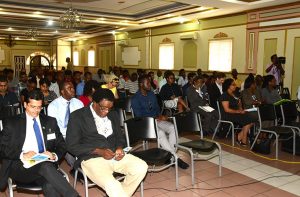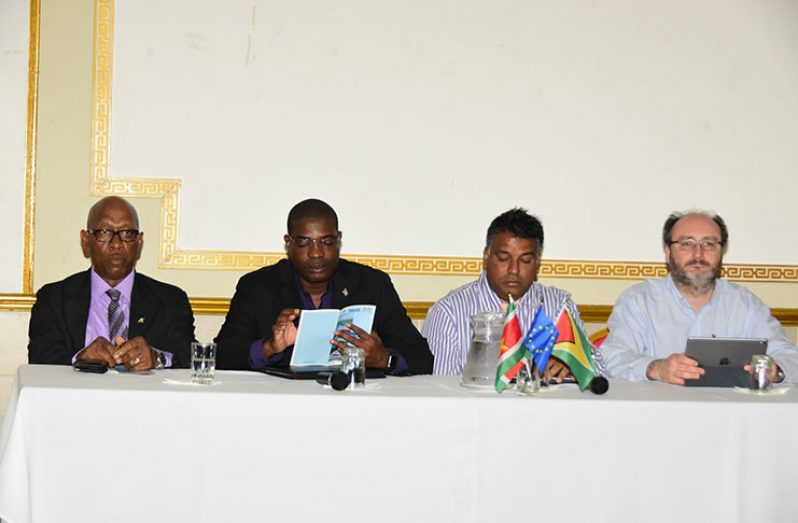A NATIONAL energy policy will soon be completed, thereby paving the way for public consultations, Minister of Public Infrastructure, David Patterson, said at a regional symposium on renewable energy at Regency Suites, Hadfield Street, Georgetown, on Wednesday.While delivering the feature address at the event hosted by the University of Guyana (UG) in collaboration with Anton de Kom University of Suriname and the Catholic University of Leuven of Belgium, Minister Patterson made it clear that renewable energy is a must for Guyana.
“Energy-efficiency and conservation are vital to sustainability and development,” he said, noting that despite possessing considerable renewable energy potential, Guyana is heavily dependent on the import of fossil fuels for energy use.
Patterson told the gathering of UG students, professors and other stakeholders, that the forum provides a valuable opportunity to engage in information- sharing on avenues which exist to progress towards renewable energy.
He said given global concerns about climate change and its effects, it is becoming even more necessary to explore innovative and sustainable solutions to the country’s energy needs.
Government is working assiduously to ensure the appropriate framework is in place to facilitate the transition.
In order to support the transition from the use of imported fossil fuels towards indigenous and renewable energy sources, the Government is working to ensure that the appropriate frameworks are in place.
“As such, we are currently in the process of completing an updated national energy policy,” he said, noting that a draft has been completed and Government will soon be engaging stakeholders through public consultation and public feedback.
The Public Infrastructure Minister said consideration is being given to suitable supporting institutional, legal and investment structures and stated that the overall goals of the policy are to provide a stable, reliable, and economic supply of energy; reduce dependency on imported fuels; promote — where possible — the increased utilisation of domestic resources; and ensure that energy is used in an environmentally sound and sustainable manner.
“The policy will therefore form the bedrock for addressing issues on energy access, energy security, climate change mitigation and climate change adaptation,” he added.
The role of energy- efficiency should be greatly emphasised and the national energy policy Patterson posited seeks to establish energy- efficiency and conservation as a sub-sector in its own right.
The minister disclosed too that soon, an energy- transition roadmap for Guyana would be finalised.
“Support will also be given to further solar photovoltaic and wind- resource development across Guyana, using grid-tie and off-grid applications. Focus will also be placed on harnessing hydropower and biomass. The development of solar and wind farms are currently being considered as viable options for the reduction of Guyana’s dependence on fossil fuels for electricity supply and the integration of renewable energy in the short to medium term. Of note is the “Green Bartica Initiative” to accommodate the Government’s plans for Guyana’s first “Green Town” and the proposed wind farm at Hope Beach.”
The symposium held under the theme, “The emerging role of renewable energy in small developing nations,” reflects Guyana’s approach to realising a green economy and country.
Meanwhile, Patterson said this year a renewable energy programme will be implemented for the installation of approximately 1.36 megawatts of solar PV systems on the rooftops of 64 Government buildings, including a 400 kW solar farm in Mabaruma.
Additionally, efforts are being made to pursue the setting up of additional solar farms in Lethem, Mahdia and Bartica.
HINTERLAND
“It must be noted that, in the coming years, greater interest will also be directed to the hinterland regions, particularly for the utilities in the recently designated towns of Bartica, Lethem, Mahdia, Mabaruma and the principal community of Port Kaituma. Emphasis will also be placed on delivering electricity to remote riverine villages, while advancing socio-economic benefits through small-business development and improved operations at health facilities and educational institutions at the least cost to consumers.”

Minister Patterson noted that the location of hinterland communities and boundaries of the national grid, make improving energy access in remote communities challenging, while areas that have access to electricity have lost many opportunities for large-scale agricultural and industrial development due to the “extremely high cost of electricity.”
He spoke of the Guyana Power and Light’s (GPL) efforts to establish a National Grid Code for the integration of distributed generation, which will provide for commercial and technical frameworks to accept electricity from renewable energy sources into its distribution network and streamline feed-in mechanisms.
“Additionally, with the establishment of the country’s first bioethanol demonstration plant at the Albion Estate in Region Six, the E-10 formulation – a blend of 90 per cent and 10 per cent ethanol – offers an opportunity for new commercial- scale enterprises that would transform the transport sector and reduce gasoline consumption. The Government plans to support the development of industrial-scale ethanol production to enable alternative transportation fuels to gasoline. There are also options to consider for promoting the production of crops for commercial-level biodiesel production and facilitating markets for the sale of biodiesel to the power producers in remote locations,” he stated.
The minister said Guyana will continue to examine opportunities for higher pressure bagasse-fuelled cogeneration to augment power- generation capacity, where feasible, to cater to higher demand over time. Power-generation options, from rice husk and wood-waste, will also be reviewed.
This year, budgetary allocations have been made for the implementation of energy- efficient measures entailing 100 per cent change-outs of inefficient lights with LED lamps, as well as the installation of occupancy sensors in Government buildings and energy-efficient outdoor lights, the minister said, while committing to ensuring additional measures to secure efficient management of energy is done.
IMPORTANT PARTNER
“The university, as a member of civil society, is an important partner in the drive for sustainable energy development in Guyana,” Patterson said, while crediting the consultative engagements for the formulation of policies, plans and projects, discovering innovative solutions for energy needs, combating climate change and addressing the impacts of climate change; and capacity-building through research and demonstration projects.
Meanwhile, Calvin Bernard, Dean of the Faculty of Natural Sciences, UG, spoke of the importance of renewable energy in small countries such as Guyana and like him, Dr Michael Scott, Deputy Chancellor, Academic Engagement at UG, said the symposium occurred at an appropriate time in Guyana’s history and development.
“Energy is known as a defining factor in the capacity of nations… it is one with which nations develop their capabilities to respond to their challenges in a very effective manner. There is no doubt that the issue of energy will dominate both intellectual and policy space in Guyana within the immediate coming years.”
As such, Dr Scott believes that focus must be placed on renewable energy as an institution, as it is critical that the minds of students be transformed.
Professor Dr Radjiskumar Mohan of the Anton de Kom University of Suriname, spoke of the aim of the collaboration. He said the project aims to improve the universities capacity to deliver programmes to enhance the social and economic development of Guyana and Suriname.
In the meantime, Professor Dr Johan Drisen of Catholic University of Leuven, elaborated on Belgium’s collaboration with South America over the years. He said collaboration had begun with Suriname and given the renewed collaboration, information-sharing has expanded.
Professor Drisen also spoke of the “significant potential” of renewable energy and spoke of distance learning techniques students of the two universities use.
“We have made a good start… there are opportunities… you have the potential to become small giants,” he stated.
Several plenary sessions followed the opening of the symposium on topics relative to renewable energy, namely, renewable energy technologies, transition from petroleum to renewables, the role of the university in the promotion of the use of renewable energy in small, developing economies, scope of bioenergy in Guyana and the developments in wind- energy systems to name a few.





.jpg)








